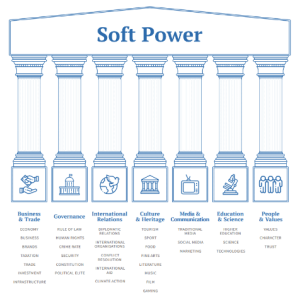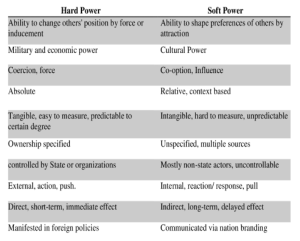Context
Recently, the Standing Committee on External Affairs recommended the Ministry of External Affairs (MEA) on soft power projection and cultural diplomacy.
About Soft Power
- It is the ability of a country to achieve foreign policy objectives through cultural attraction rather than through force, coercion or indeed large deployments of money.
- Country’s soft power, according to Nye, rests on three resources:
-
 Culture: Where it is attractive to others. Ex: Hinduism, buddhism etc
Culture: Where it is attractive to others. Ex: Hinduism, buddhism etc- Political Values: When it lives up to them at home and abroad. Ex: Democratic, Communist etc
- Foreign Policies: When others see them as legitimate and having moral authority. Ex: Neighbourhood First Policy, Panchsheel Policy of Peaceful Coexistence.
India and it’s Soft Power
- India is globally recognized as a non-aggressor country, whose vision is inclusive and worldview rests in the idea of Vasudhaiva Kutumbakam – the world is one family.”
- According to a study by Observer Research Foundation (ORF) in 2019, India is endowed with enormous soft power resources in the form of:
- Diaspora: 31 million people living in 200 countries. They act as a bridge between India and other countries.
- Media: Largest film industry in the world.
- Cuisine: Most popular ethnic food in the world.
- Yoga: Yoga has become one of the most prominent Indian cultural export and is being practised widely all over the world.
- The United Nations declared 21 June as International Yoga Day.
- Art and Literature: Music (classical, folk, pop, rock), its Art (painting, sculpture, architecture), Philosophy (Vedanta, Yoga Sutras), Nobel laureates like Rabindranath Tagore and Amartya Sen), Science (space program, IT industry), sports (cricket, hockey).
- Democracy: Largest electoral system in the world.
- Religion: Hinduism, Buddhism, Sikhism, Jainism etc
Significance of Soft Power for India:
 Global influence: Soft power can help India to enhance its image and reputation in the world, especially among its neighbors and strategic partners.
Global influence: Soft power can help India to enhance its image and reputation in the world, especially among its neighbors and strategic partners. -
- This can help India to counter the negative perceptions and stereotypes that may exist about it in some parts of the world.
- Advancing Foreign Policy Goals and Interest: Soft power can help in promoting regional stability, combating terrorism, expanding trade and investment, and strengthening multilateral cooperation.
- By using its soft power resources, such as diplomacy, cultural exchanges etc, India can build trust and goodwill with other countries and persuade them to support its positions and initiatives.
- This can also help India to balance the hard power of other countries that may pose challenges or threats to its security and sovereignty.
- Shape the global agenda and norms on issues that matter to it, such as climate change, human rights, democracy, peace, and development.
- Soft power can help India to assert its role as a responsible and constructive global actor that upholds the values of pluralism, tolerance, and cooperation.
- Economic Opportunities: A strong soft power presence can attract foreign investments, tourists, and business collaborations.
- India’s cultural exports, such as Bollywood films, traditional arts, and handicrafts, contribute to its economic growth by generating revenue and employment opportunities.
- Strengthening Diaspora Connections: India’s soft power connects with its vast diaspora population, creating a sense of pride and affinity towards their homeland.
- This bond often translates into active support for India’s interests in their adopted countries.
- Building Strategic Partnerships: Soft power can help India build strategic partnerships with other countries based on shared values and interests.
- These partnerships can lead to collaborations in various sectors like education, technology, healthcare, and defense. Ex: India’s outreach to Pacific Island countries, which have substantial Indian Diaspora.
- Soft Power Diplomacy: India’s government often employs soft power diplomacy to complement its traditional diplomatic efforts.
- For example, initiatives like the Indian Council for Cultural Relations (ICCR) and the Ministry of External Affairs’ cultural outreach programs promote India’s soft power globally.
Indian Council for Cultural Relations (ICCR)
- It is an autonomous organisation of the Government of India that aims to promote and strengthen cultural relations and mutual understanding between India and other countries.
Objectives of ICCR
- To actively participate in the formulation and implementation of policies and programmes pertaining to India’s external cultural relations.
- To foster and strengthen cultural relations and mutual understanding between India and other countries.
- To promote cultural exchanges with other countries and people.
Limitations Hindering India’s Soft Power Projection:
- Inadequate financing: India spends much less on its cultural diplomacy than other countries like China, France, and the UK.
- Budget allocation for ICCR is insufficient and erratic, which affects its ability to plan and execute its activities.
- Lack of coordination: There is no clear division of roles and responsibilities among various institutions involved in India’s soft power diplomacy, such as MEA, ICCR, Indian missions abroad, and other line ministries.
- Lack of synergy and communication between these institutions, which leads to duplication of efforts and wastage of resources.
- Shortage of skilled manpower: India faces a dearth of qualified and trained professionals who can effectively manage and implement its soft power initiatives.
- There is a lack of incentives and recognition for those who work in this field, which affects their motivation and performance.
- Lack of clarity on the mandate of ICCR: ICCR, which is the apex body for India’s cultural diplomacy, does not have a clear vision and mission statement that defines its objectives and functions.
- Lack of a comprehensive soft power strategy: India’s diplomats and government agencies have not been able to develop a matrix to assess the effectiveness of India’s cultural diplomacy efforts.
- According to the Global Soft Power Index, India’s soft power potential is underutilized due to lack of coordination, resources, and strategy.
Global Soft Power Index
- India has jumped a spot from rank 29 in 2022 to 28 in 2023.
- Index is released by Brand Finance, the world’s top independent brand valuation and strategy consultancy.
- It is the world’s most extensive research study on impressions of nation brands, polling over 100,000 respondents from 121 countries.
Recommendation by Standing Committee on Soft Power and Cultural Diplomacy:
- Policy Clarity: The MEA should create a policy document on India’s soft power projections, outlining its tools and how it is projected abroad, along with a vision statement for the future.
- Restructuring ICCR: ICCR should be reformed to make it more autonomous, accountable, and efficient, with a clear mandate and vision statement that reflects its goals and strategies.
- Central government should increase ICCR’s budgetary allocation by Rs 500 crore so that it can conduct India’s soft power and cultural diplomacy in a robust manner.
- Body for Coordination: The article advocates that there should be a central body that can coordinate and monitor the soft power initiatives of various ministries and agencies, such as tourism, education, sports, science and technology, etc.
- It should have representatives from MEA, ICCR, Ministry of Culture and other stakeholders who can ensure synergy and alignment of policies and programs.
- Yoga certification board: India should establish a yoga certification board that can standardize and regulate the quality and authenticity of yoga teachers and institutions across the world.
- India should organize more yoga festivals and events to showcase its diversity and expertise in this field.
- Interact with Indian diaspora: India should create a mechanism to engage with the diaspora more effectively and regularly, such as through online platforms, cultural exchanges, scholarships, awards, etc.
- Ex: Pravasi Bharatiya Divas (PBD) has been celebrated on 9th January every year since 2003 to mark the contribution of the Overseas Indian community in the development of India.
- Promoting tourism: India should invest more in developing its tourism infrastructure, facilities, and services.
- India should launch more campaigns and initiatives to attract more tourists from different regions and segments.
- MEA should open more AYUSH centres overseas strategically and in a planned manner.
Conclusion
- India’s soft power derives not only from its cultural heritage (music, dance, arts, etc.) and economic strength but also from its rich history of philosophical and wisdom traditions that have influenced people globally for centuries, to discover healing, solace and transformation and learn to peacefully coexist.
News Source: The Print
![]() 3 Aug 2023
3 Aug 2023
 Culture: Where it is attractive to others. Ex: Hinduism, buddhism etc
Culture: Where it is attractive to others. Ex: Hinduism, buddhism etc Global influence: Soft power can help India to enhance its image and reputation in the world, especially among its neighbors and strategic partners.
Global influence: Soft power can help India to enhance its image and reputation in the world, especially among its neighbors and strategic partners.